This delicious roasted honeynut squash recipe is topped with miso maple butter for a savory and sweet side dish. This is the best way to enjoy these cute little squash.
Honeynut squash is a type of winter squash that's a cross between butternut and buttercup squash.
They're about half to a third of the size of butternut squash, and they're much sweeter. They have bright orange flesh and are easy to roast. If this is your first time trying honeynut squash, you are in for a treat!
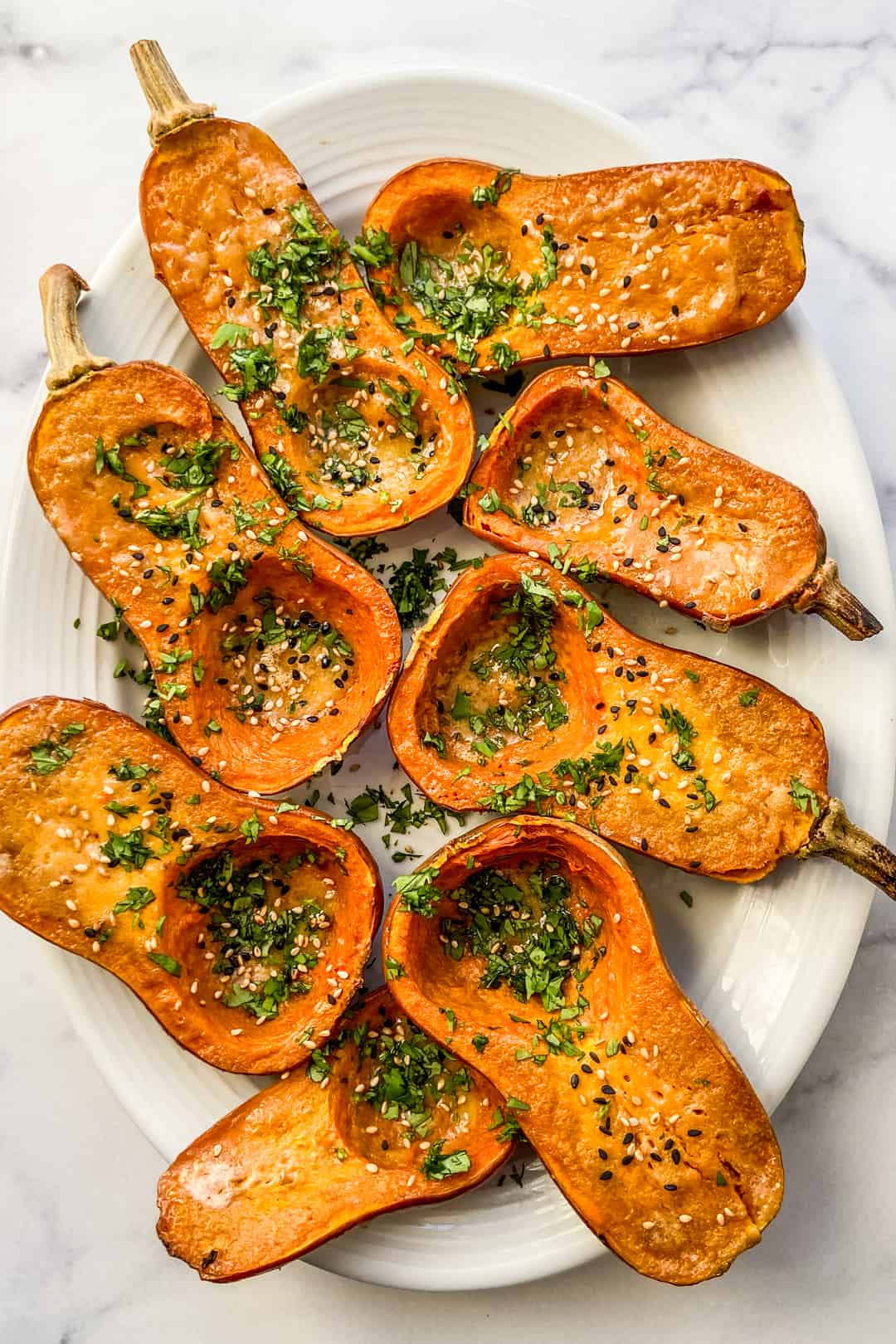
Jump to:
What is Honeynut Squash?
You are going to love honeynut squash! It's a cultivar bred by Cornell University professor Michael Mazourek and Chef Dan Barber of Blue Hill at Stone Barns in New York. It looks like a mini butternut squash.
You can use honeynut squash in mashes, purees, and soups, but I think it tastes best when roasted in a hot oven until caramelized. It has amazing natural sweetness and a rich flavor.
Honeynut squash skin is thin enough that you can eat it (no peeling necessary like butternut squash), but I like to skip the skin and enjoy the creamy roasted interior.
This type of squash is not typically commercially grown, so it won't be available in most grocery stores (you may find it at Whole Foods). You're most likely to find it at a local farm stand or farmer's market or grow it in your own garden. It's usually available from late September to late December.

Ingredients
- Honeynut Squash - You'll need 4 honey nut squash for this recipe. Wash the outside as the skin is edible and can be consumed as well (if you like it - I personally don't enjoy it)
- Butter - You'll need 2 tablespoons of melted butter.
- White Miso - You'll need 1 tablespoon of white miso paste, also called shiro miso.
- Maple Syrup - You'll need 1 tablespoon of maple syrup. If you don't like the flavor of miso, you can substitute this for honey (or hot honey) or brown sugar.
- Rice Wine Vinegar - You'll need 2 teaspoons of rice vinegar - this will add a nice kick of acid to bring out all the flavors.
- Sesame Seeds - You'll need 1 teaspoon of sesame seeds for topping. I use a mixture of toasted white sesame seeds and black sesame seeds, but use whatever you have on hand.
- Parsley - This is optional, but you can use 2 tablespoons of chopped parsley to top the roasted squash.
Instructions
Preheat the oven to 425 degrees F.
Wash the squash and then halve them with a sharp knife. Scoop out the seeds and any stringy flesh. Place the squash skin side down on a parchment-lined sheet pan in a single layer.
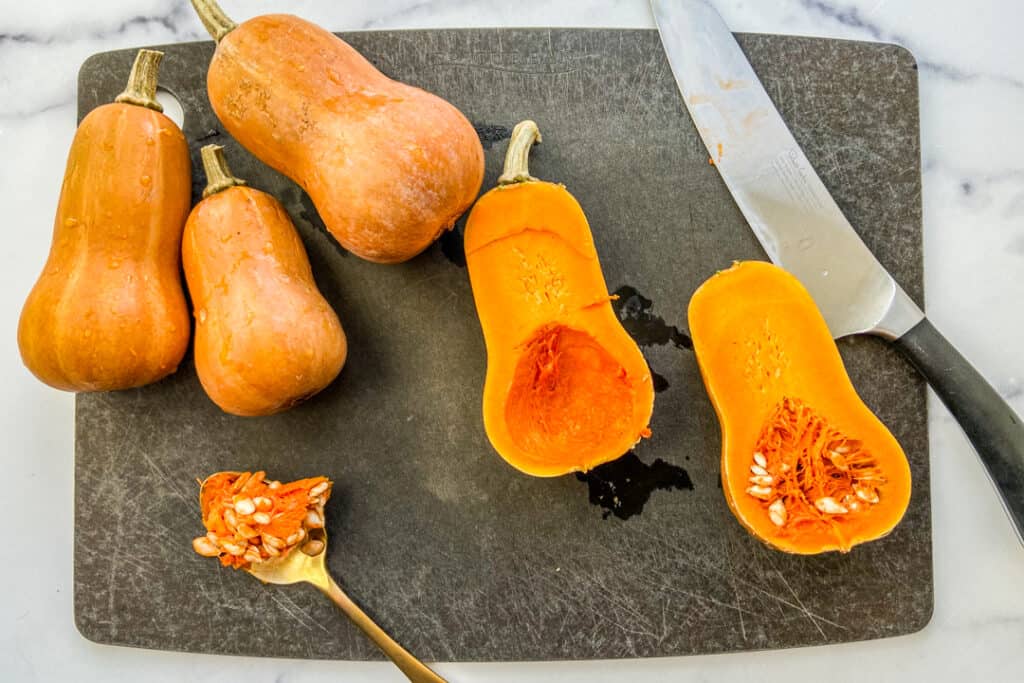
Combine the melted butter, miso, maple syrup, and vinegar. Whisk till combined. Brush the butter mixture over the squash.
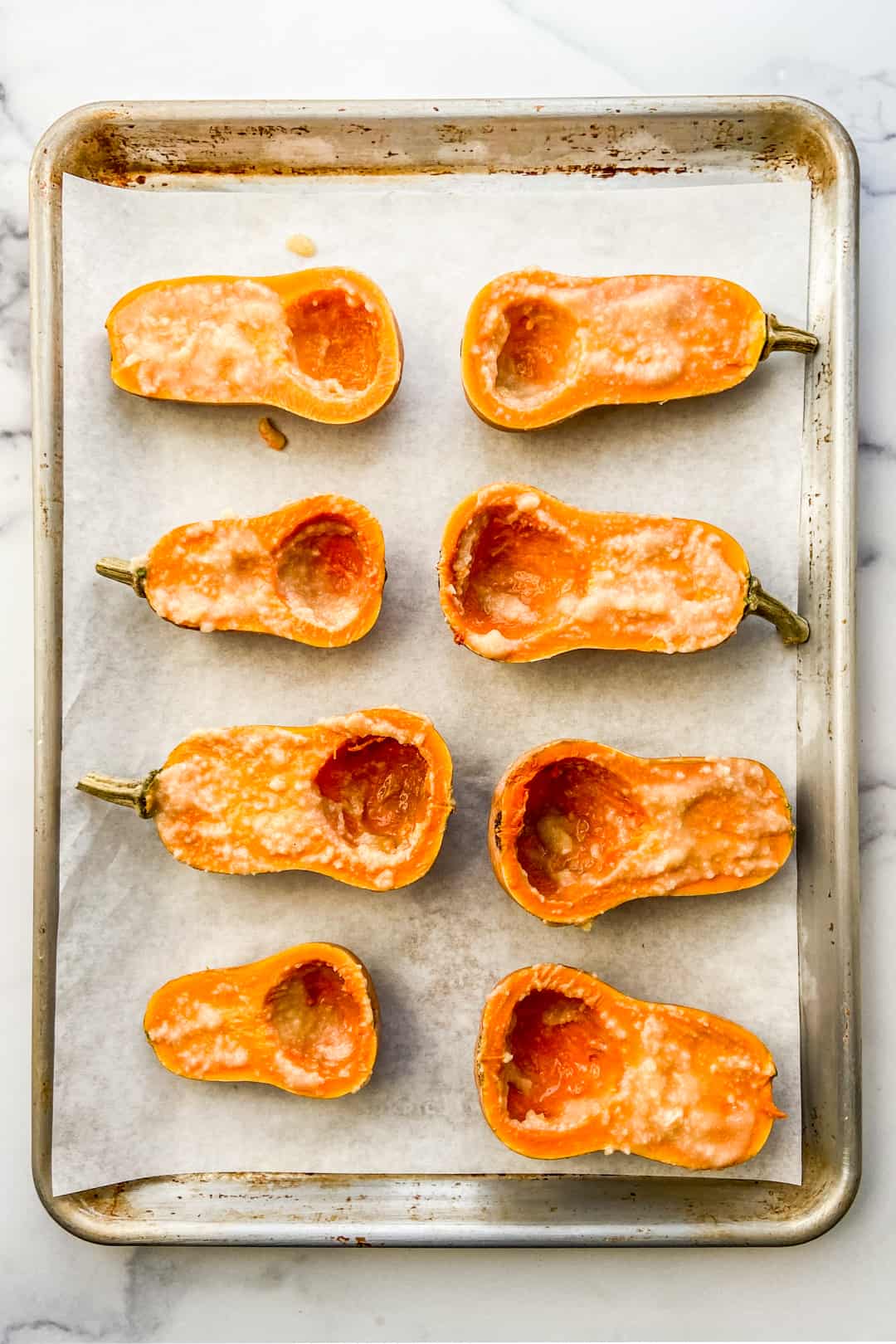
Roast the squash for 25 minutes or until fork tender.
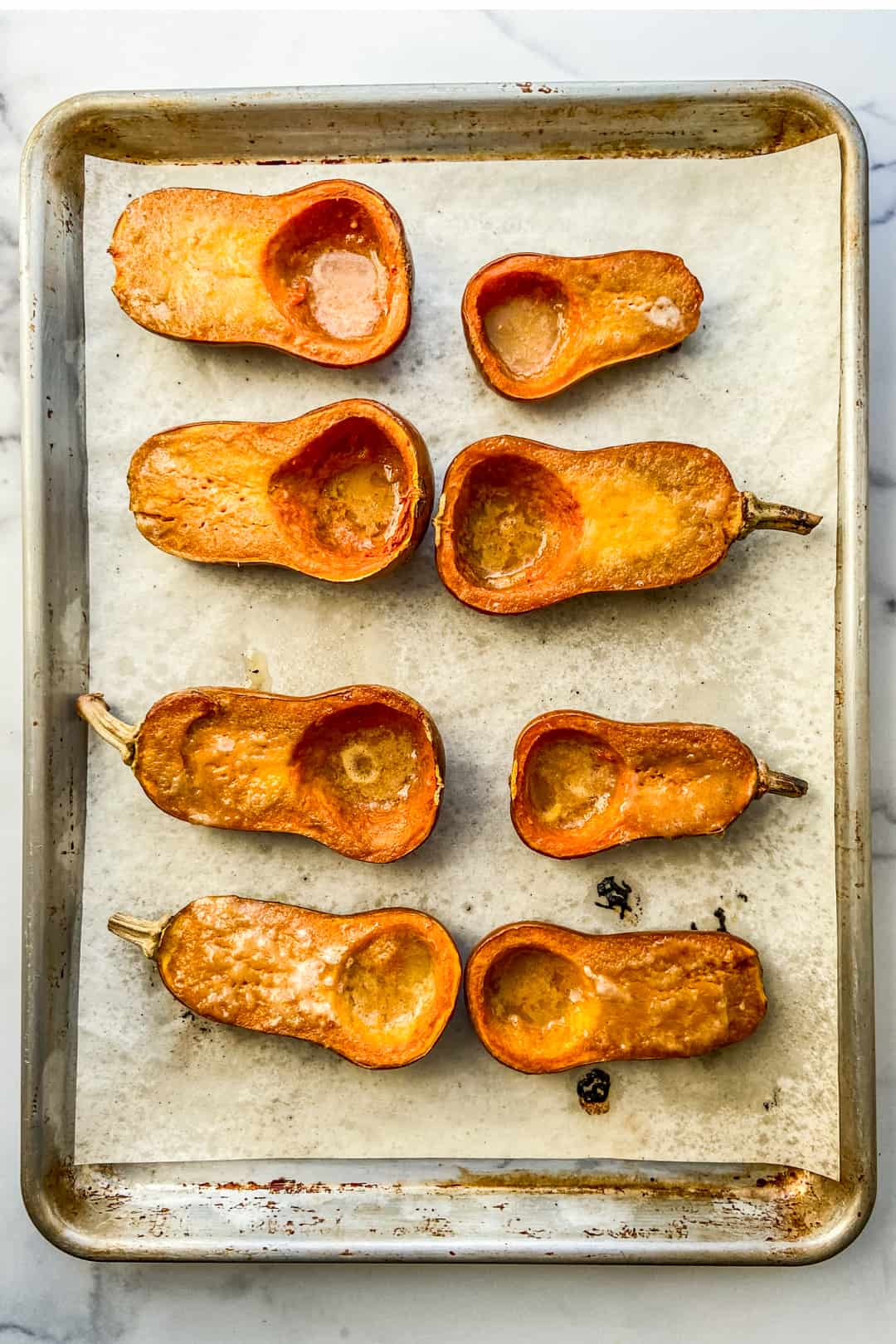
Remove the squash from the oven and top with the chopped parsley and sesame seeds. Serve immediately.
Tips for Making Honeynut Squash
Cooking Tips - Make sure to roast the squash on a piece of parchment paper - this will make cleanup easier and stop the squash from sticking to the baking sheet.
Test the squash by pricking it with a fork to ensure it's tender before removing it from the oven. If it's ready, the fork will slide in easily.
Diet/Allergy Alternatives—To make this recipe vegan, substitute the butter for vegan butter or olive oil.
Storage
Refrigerate - leftover squash can be kept in the refrigerator for up to 4 days in an airtight container.

How to Choose the Best Squash
When you're choosing squash in the grocery store or farmer's market there are a couple of key traits to look for.
- No Gashes, Cuts, or Tears - squash with deep gashes or anything beyond a small surface nick might be rotten inside.
- No Soft Spots - soft spots or bruising on squash suggests that it is too old and will have at least some rotten spots.
- Matte Skin - shiny skin indicates a squash has been picked to early.
- Deep Colors - squash should be vibrantly colored. Any squash that looks pale was likely picked too early and will not be ripe.
- Heavy for their Size - squash that are fresh will have a higher water content and will feel heavy for their size.
More Seasonal Squash Recipes
If you love winter squash, try some of our other favorite squash recipes. And don't forget that you can roast the seeds - here's a guide to roasting squash and pumpkin seeds.
- Roasted Acorn Squash Soup - a delicious creamy soup with acorn squash, onions, garlic, and apple.
- Za'atar Roasted Butternut Squash - an easy side dish with a kicky spice blend.
- Roasted Squash and Grapes - a beautiful fall side dish with delicata squash and red grapes.
- The Best Butternut Squash Soup - creamy and flavorful, this soup has all the fall flavor.
If you try this honeynut squash recipe, let us know! Connect with us on Instagram and share your photos or leave us a rating.
Roasted Honeynut Squash
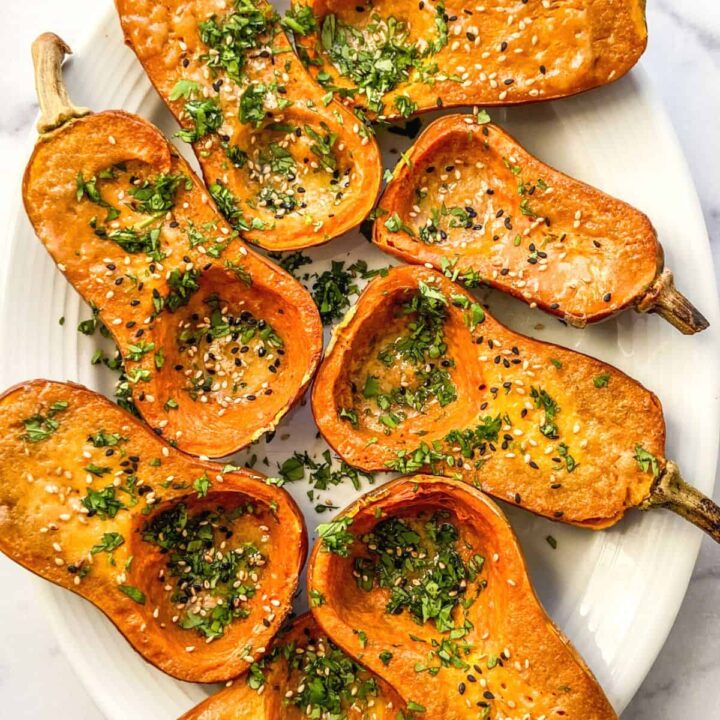
This delicious miso maple roasted honeynut squash is a wonderful side dish for fall or winter.
Ingredients
- 4 Honeynut squash
- 2 tablespoons butter, melted
- 1 tablespoon white miso paste
- 1 tablespoon maple syrup
- 2 teaspoons rice wine vinegar
- 2 tablespoons chopped parsley
- 1 teaspoon sesame seeds
Instructions
- Preheat the oven to 425 degrees F.
- Wash the squash and then halve them. Scoop out the seeds and any stringy flesh. Place the squash skin side down on a parchment-lined baking sheet.
- Combine the melted butter, miso, maple syrup, and vinegar. Whisk till combined. Brush the butter mixture over the squash.
- Roast the squash for 25 minutes or until fork-tender.
- Remove the squash from the oven and top with the chopped parsley and sesame seeds. Serve immediately.
Nutrition Information:
Yield:
6Serving Size:
1Amount Per Serving: Calories: 106Total Fat: 4gSaturated Fat: 3gTrans Fat: 0gUnsaturated Fat: 1gCholesterol: 10mgSodium: 143mgCarbohydrates: 17gFiber: 5gSugar: 5gProtein: 2g







Leave a Reply